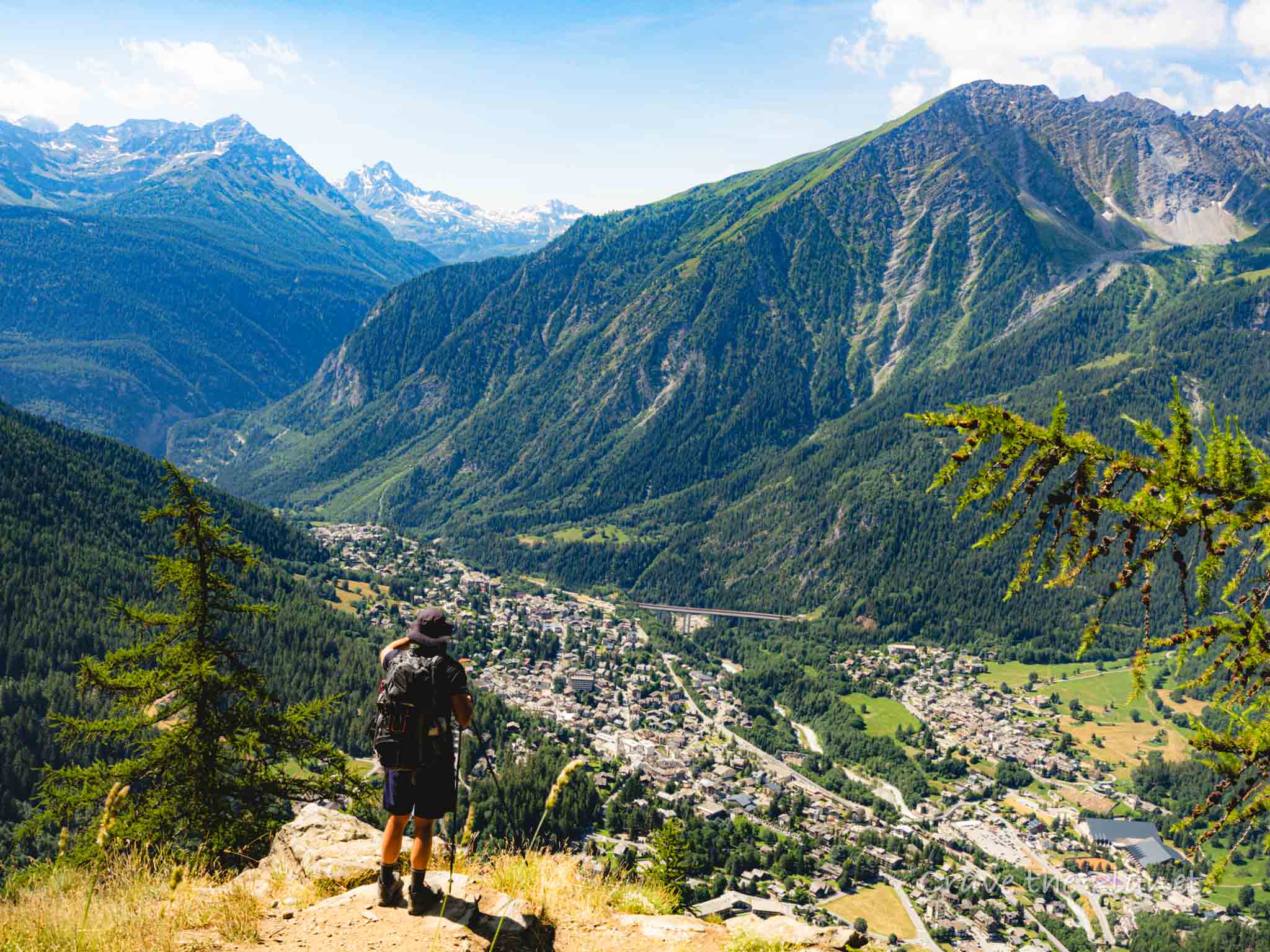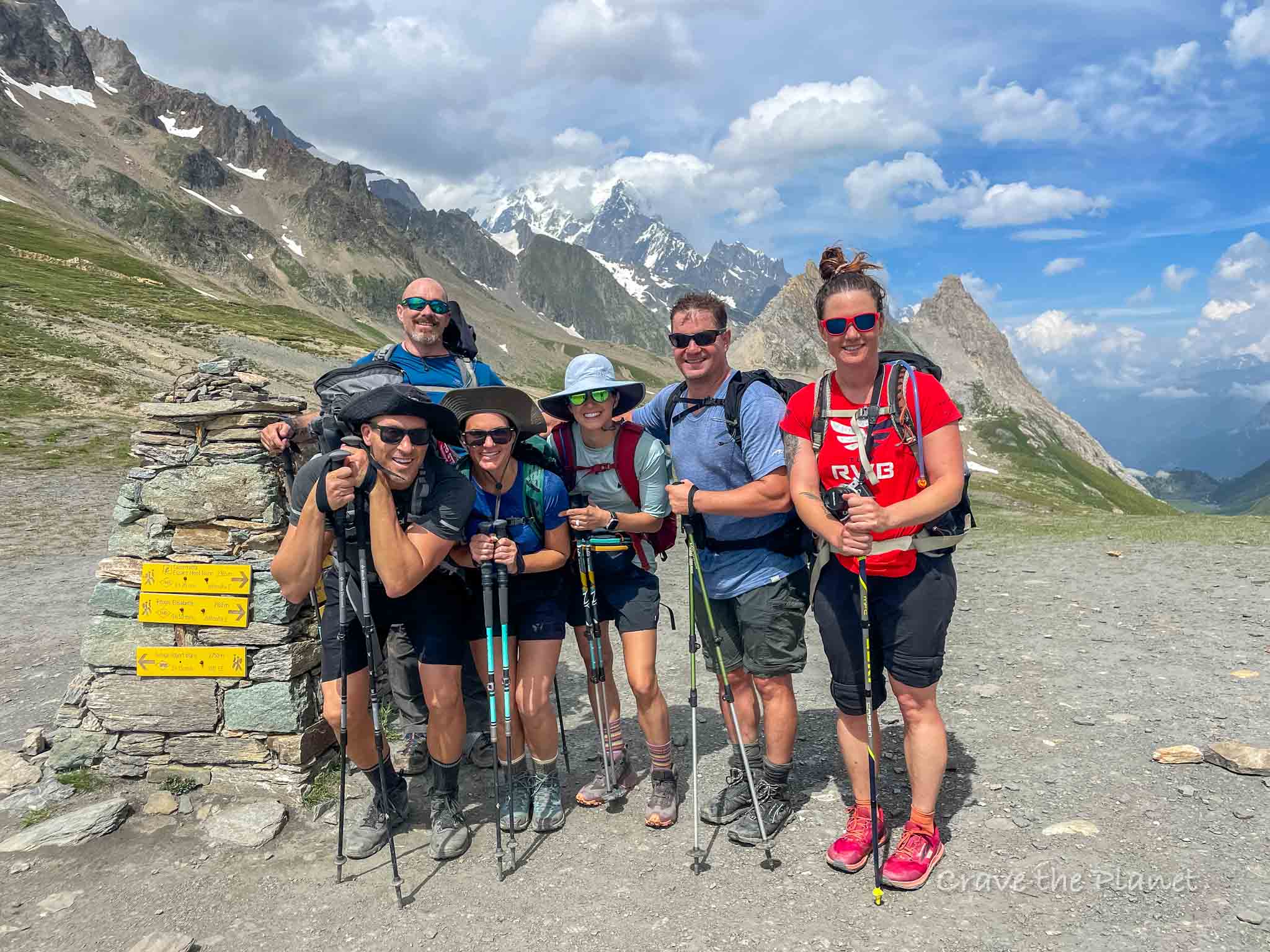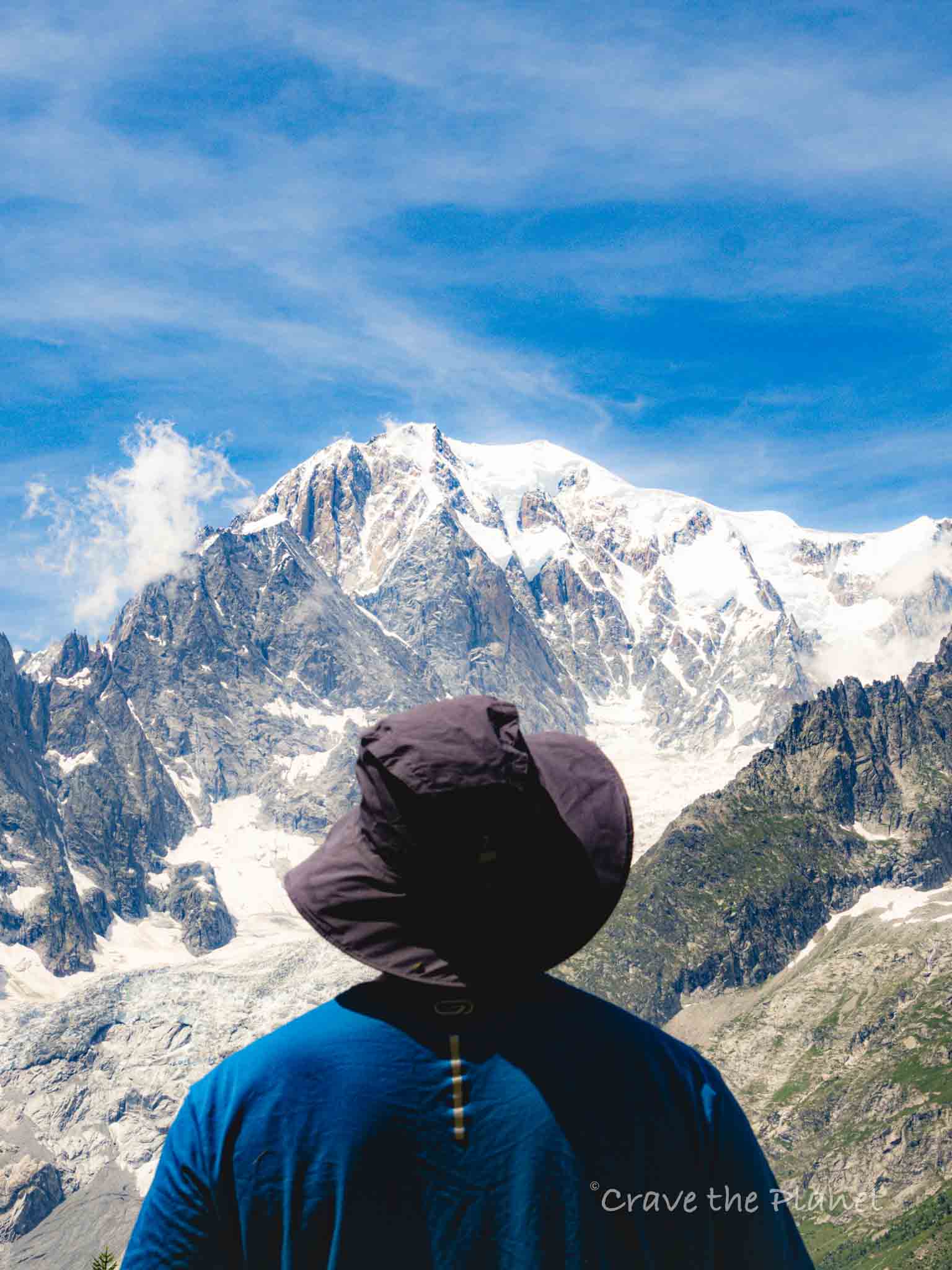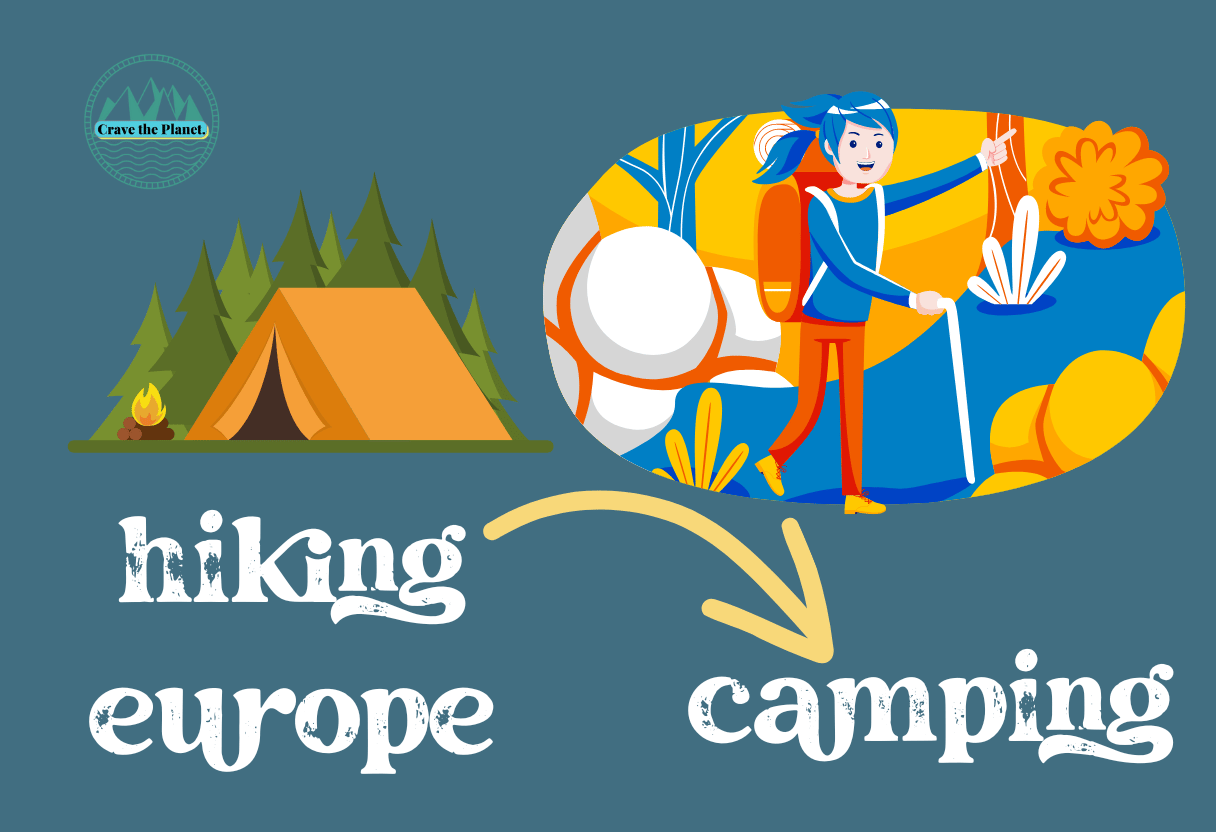I absolutely loved the TMB hike with friends, but it’s not exactly “easy”. It’s a beginner “trek” filled with good food, wine and comfy beds – but awesome glaciers, steep trails and wonder filled views.
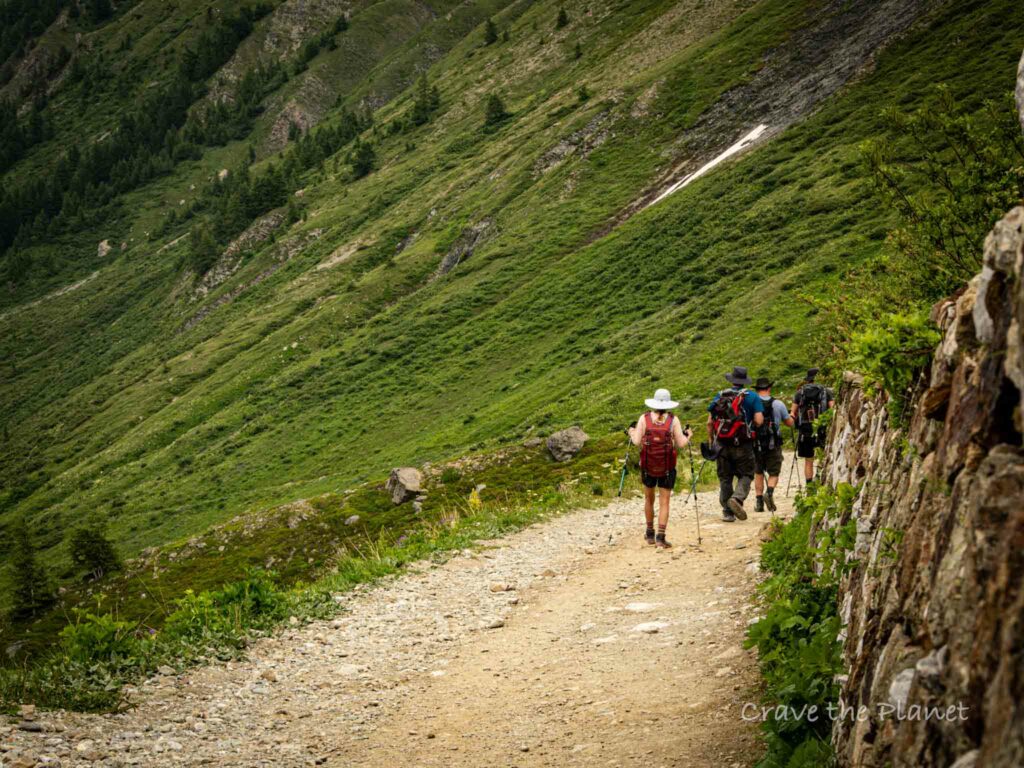
So, how hard is the Tour du Mont Blanc? Well….it depends. It’s not “technical” or really scary (heights, drops offs, climbing), but it’s over 100 miles and the phrase “up and down” sums it up. Over 35,000 feet of “up and down”.
Embarking on the Tour du Mont Blanc offers a cherished experience for avid hikers, weaving through France, Italy, and Switzerland. This renowned trail circling the majestic Mont Blanc massif requires some level of preparation due to its length and physical demands.
Quick Verdict: How Difficult is the Tour du Mont Blanc Hike?
- At roughly 165 km or 103 miles, the TMB is a beginner trekking route most people can accomplish with a moderate level of fitness.
- You need to be able to walk steep terrain: in total it is 10,600m (35,000ft) of up and down.
- There are gondolas and taxis to shorten route.
- You don’t need to be a runner or super athlete to complete the Tour du Mont Blanc, but you should be comfortable walking 6-8 hours a day on rocky or hilly terrain for 7-12 days.
- Your pace and choice of route will determine how hard it is.
- Proper preparation is essential due to the trail’s elevation challenges.
- Understanding the route’s complexities enhances the trekking experience and ensures safety.
- Altitude sickness is not a concern.
- You do not need climbing equipment and there are not many dangerous drop offs.
- It’s harder if you’re camping the TMB.
- The Tour du Mont Blanc is one of the best treks in Europe encompassing three European countries.
To ensure a successful journey around the highest peak in the Alps, it’s imperative to understand the complexities of the route and prepare accordingly.
From the steep inclines to the unpredictable weather, knowledge of the terrain and adequate preparation will make the trek not only manageable but immensely rewarding.
⛰️ Looking for an epic yet accessible hiking travel adventure?
Unlock the secrets of hut-to-hut hiking in Europe with our FREE course! Transform the way you trek and prepare for the journey of a lifetime. Try my course What to Expect Hut to Hut Hiking to reduce fear and answer all your questions.
Enroll Now for FreeDifferent Tours of Mont Blanc: Distinctive Challenges
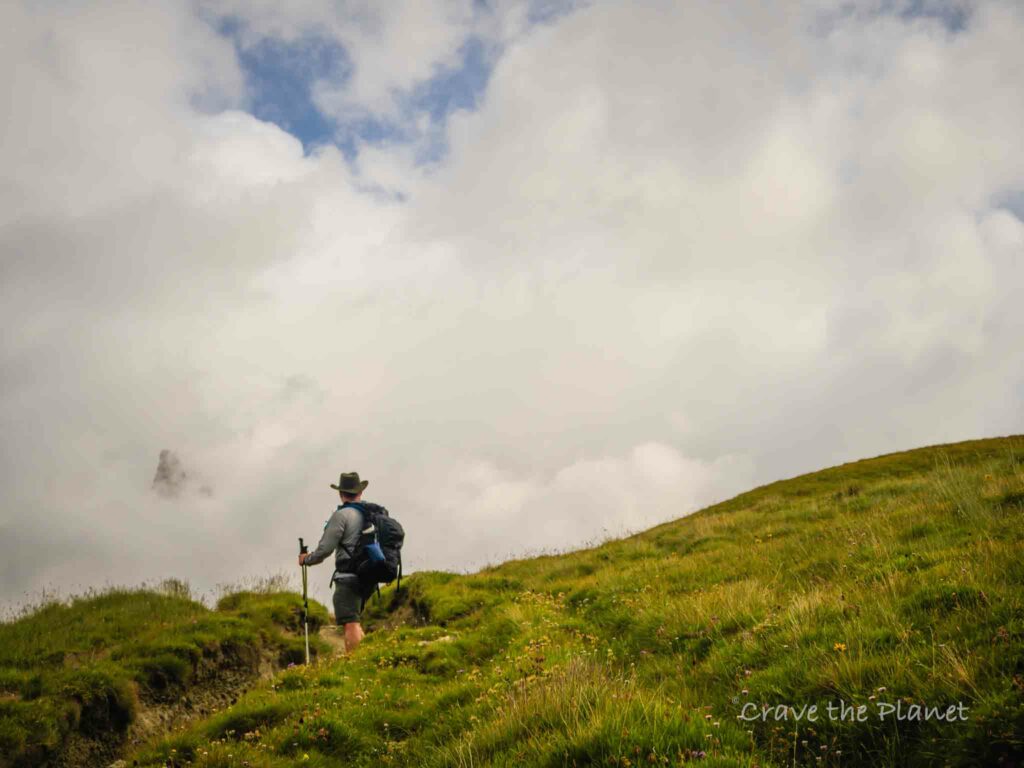
Challenging yet Manageable: The Complete 10-Day Circuit
For those of you ready to embrace the Mont Blanc circuit in its entirety, the ten-day trek presents a considerable physical trial, demanding an impressive 10,000 meters of cumulative ascent over 160 kilometers.
Although technically undemanding, the full loop is the preferred choice for many. Its popularity stems from the opportunity to fully immerse oneself in the stunning panorama that France, Italy, and Switzerland have to offer.
Typically accomplished within 9 to 11 days, an estimated walking duration of 6 hours a day is to be expected.
Along this classic route, traverse balconied paths with ample time to absorb the breathtaking vistas of Mont Blanc’s massif. Your trek will take you through varying terrains: lush forests, green meadows, high ridges, and charming villages. This path is all about pacing yourself as you savor the diverse landscapes at your leisure.
Accelerated Yet Scenic: The 5-Day Express
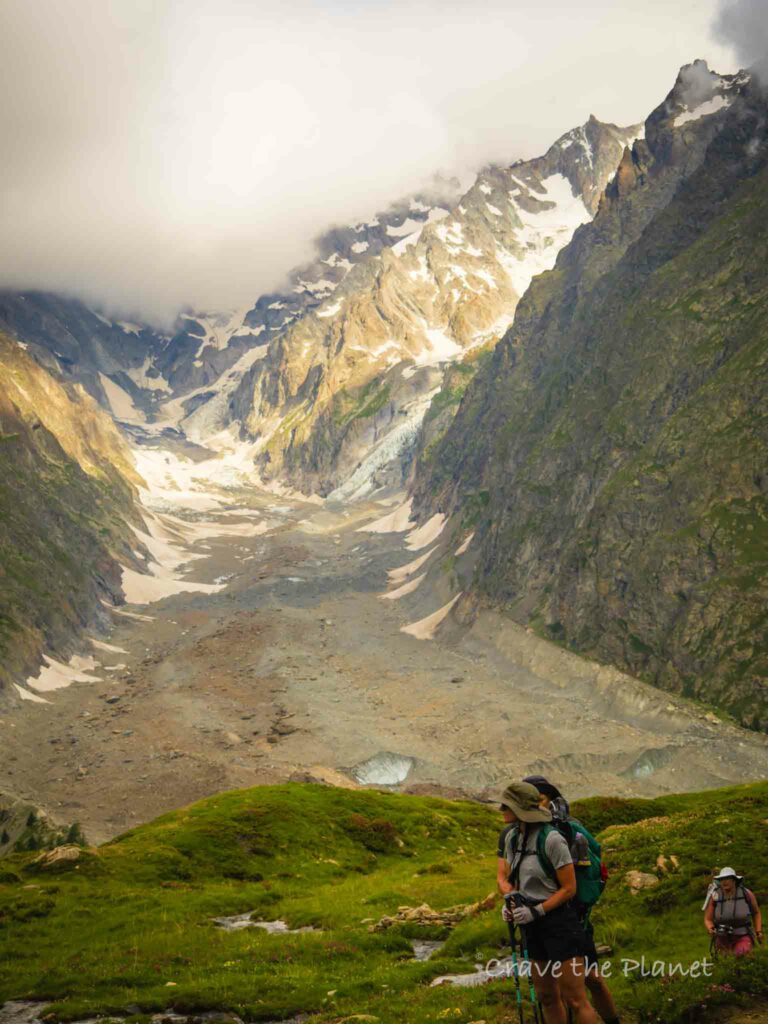
If a quicker pace suits you, or if you’re constrained by time, the 5-day southern section variant of the Mont Blanc trek might be your ideal match. This shorter version is a prime choice for those who are either daunted by the standard circuit’s duration or simply have limited time.
Embarking on this journey, you still experience the most scenic and iconic sections of the route, without the commitment of a longer trek. Utilize bus transfers and ski lifts to breeze past the more demanding segments. This approach strategically condenses the essence of the classic trek for those of you keen on a shorter, yet fulfilling adventure.
The High-Altitude Endeavor: Blending Trekking with Mountaineering
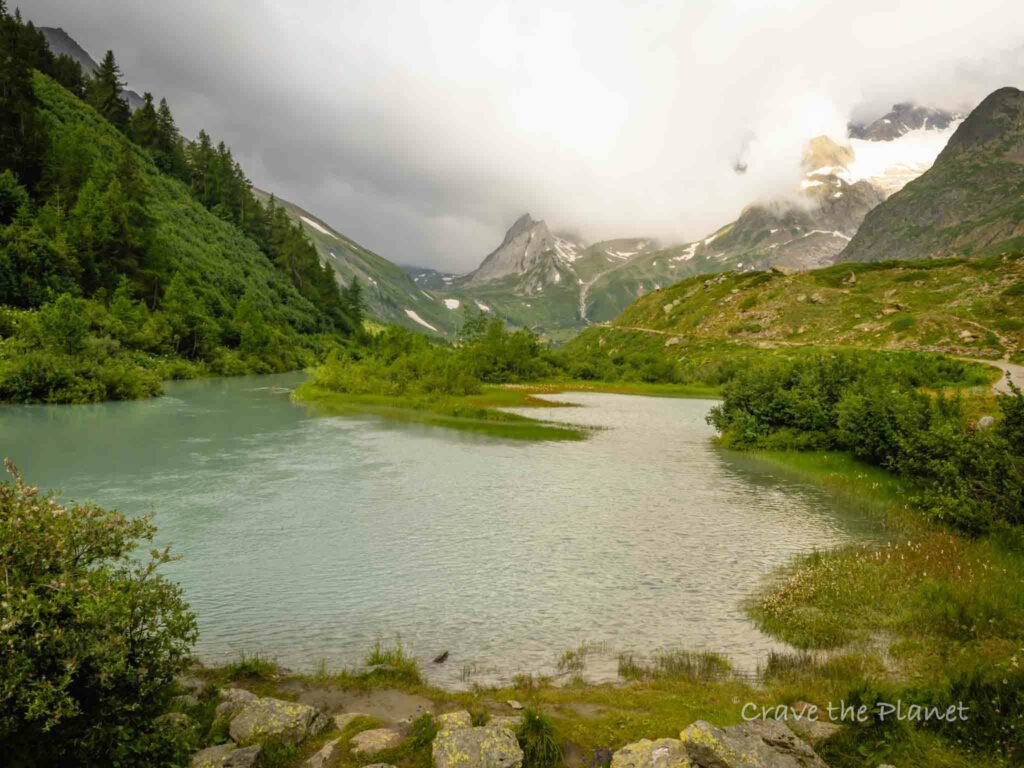
Seekers of alpine thrill and seasoned trekkers, the Haute Route of the TMB beckons you. This variant strikes a balance between vigorous hiking and the technicality of mountaineering. Although it spans the same duration of 7 days, the Haute Route is undeniably a step up in terms of difficulty.
Expect to navigate through genuine glacier crossings and alpine terrains that command a heightened sense of adventure and mountaineering expertise. The Haute Route is the epitome of a high-altitude escapade requiring robust physical fitness and a seasoned hiker’s resolve.
Do note that the TMB’s Haute Route should not be mistaken for the renowned Chamonix-Zermatt Haute Route.
Challenges of the Mont Blanc Circuit
Climatic Challenges
The weather on the Mont Blanc Circuit can be unpredictable and can rapidly shift from temperate to extreme cold, even during summer months. Mountaineers should be ready for snow and especially abrupt drops in temperature, with the potential for fast-onset cold snaps.
Be Prepared:
- Choose your travel period carefully, aiming for a season that aligns with your comfort level and experience.
- Equip yourself with layers to combat the cold: a moisture-wicking base layer, an insulating middle, and a protective outer shell.
- Research and stay updated on weather forecasts before and during your trek.
Encountering Storms
Storms are a significant hazard due to two factors: treacherously slick paths post-storm and lightning risks.
Safety Measures:
- Choose appropriate footwear with reliable traction and consider trekking poles for added stability.
- If caught in a storm, find a safe area away from tall trees and water. Remove metal items and insulate yourself from the ground.
Navigating Fog
Fog can roll in suddenly, obscuring your visibility and increasing the risk of disorientation.
Navigation Tips:
- Carry a compass, a detailed topographic map, and understand how to use them.
- A whistle can be essential for signaling your location in low-visibility conditions.
- Properly planning your route can be invaluable in foggy conditions. Alternatively, consider hiring a guide for added safety.
Technical Terrain
The trek includes significant elevation changes, with more than 10,000 meters of cumulative ascent and descent over the course of the journey.
Preparation Strategies:
- Engage in regular hiking in varied terrain to accustom your body to elevation changes.
- Cardio exercises like running or biking can also enhance your overall endurance. Consistency is key.
- If you opt for the high route with more technical sections, familiarize yourself with the challenging passages and consider the aid of an experienced guide.
Physical Strain
While maintaining a good health level is critical, the ongoing stress and exertion can lead to muscle fatigue and general wear.
Lessen the Strain:
- Training and conditioning your body is the best defense against physical strain.
- Consider services that transport your gear between stops.
- Prioritize your refuge reservations well in advance for a guaranteed restful stop.
Training for the Tour
Proper training is essential, and sports are your best tool, with swimming, cycling, and running being particularly beneficial.
Training Activities:
- Swimming offers endurance gains and conditions all body muscles.
- Cycling conditions your leg muscles and cardiovascular system.
- Run, or even better, trail run to prepare for the varied terrain and elevation you’ll encounter.
Become a European Adventure Travel Insider in Just 5 minutes
✨Unlock Europe’s best-kept secrets with our free bi-weekly newsletter.
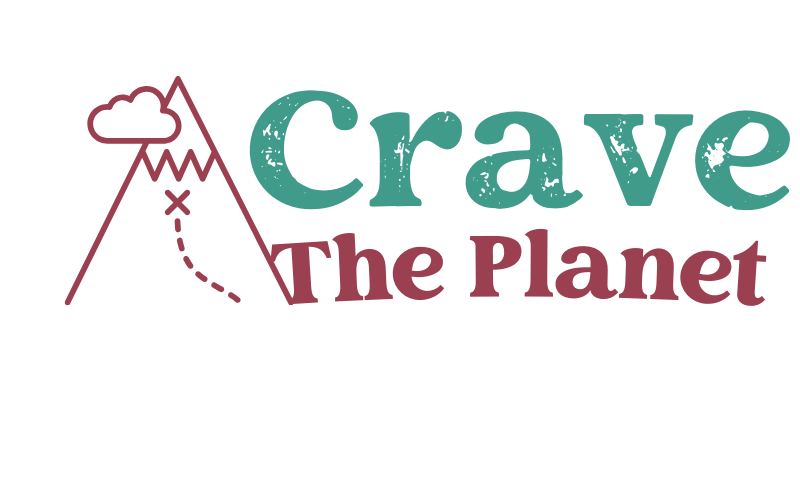
Final Verdict: Ways to Book a Hut to Hut Hiking Trip
Self-Guided Tour Planning Service
- [Self-Guided] - You're on your own once you start
- Must book in Oct to Jan of year prior to hike
- Fully done for you route
- Service finds and books your huts
- Maps provided on app
- small groups (<10 typically)
- local Chamonix guides
- all transfers/breakfast/dinner/accommodations included
- airport transfer included
- stay in the insanely beautiful Rifugio Bonatti and other huts at high elevation
- Cheapest Option
- Most Freedom
- Take side excursions as you like
Camping
- campgrounds can be crowded
- reservations often needed in advance
- Wild camping is prohibited or limited by elevation
Common Inquiries About How Hard is the Tour du Mont Blanc?
Required Fitness Level for Tour du Mont Blanc
The Tour du Mont Blanc is a physically demanding trek that requires a good level of cardiovascular fitness and strength. You should be able to comfortably hike for several hours each day over consecutive days, and handle elevation gains and losses. Regular exercise and training in the months leading up to your hike will greatly enhance your experience. Tour du Mont Blanc Trekking is not technical, but challenging.
Viability for Novice Hikers
Novice hikers can complete the tour, but adequate preparation is crucial. Choose a comfortable hiking pace, allow extra days for acclimatization, and consider professional guides for safety and navigation assistance.
This hike does not go into a height where altitude sickness is a problem for most people.
Possible Hazards on the Trail
- Adverse Weather: Rapid changes could lead to hypothermia or heatstroke.
- Challenging Terrain: Risk of slips, trips, and falls on steep or uneven paths.
- Altitude Sickness: Symptoms could occur due to high elevation.
Typical Duration for Trek Completion
Most hikers complete the tour in 7 to 11 days. Planning for rests and sightseeing, or breaking up longer stages, may extend your trip.
Trail Difficulty Rating
The Tour du Mont Blanc is classified as moderately difficult due to its long distances, elevation changes, and occasionally steep sections. Hiking experience is advantageous.
Essential Planning Stages for the Itinerary
- Route Segmentation: Divide the tour into daily manageable stages.
- Accommodation: Book refuges or hotels in advance, especially during peak season.
- Gear and Equipment: Ensure you have all necessary hiking gear, including sturdy boots, weather-appropriate clothing, and navigation tools.
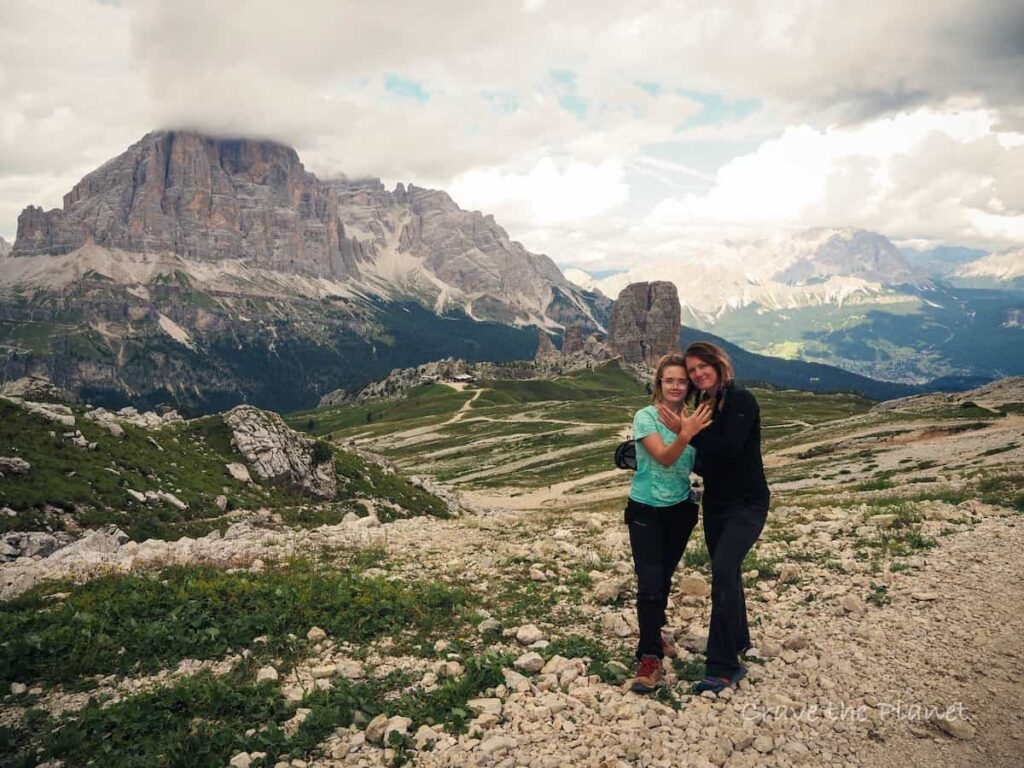
nature Travel Resources
Planning your trip?
- 🏨 Book your perfect stay on Booking.com
- 🎢 Make your trip more exciting with GetYourGuide
- 🚗 Hire a car with Discover Cars
- ✈️ Find cheap flight tickets with WayAway
- 📲 Buy eSIMs with Airalo
- 🥾 Get off the beaten tourist path with Fully Planned and Booked Self-Guided Hut to Hut Hiking Trip
- 🥾⭐️ Step into social adventure with Guided Group Adventure and Hiking Tours in Europe with Local Guides.
More Hut to Hut Hiking Travel Blogs
Craving a Hut to Hut Hiking Adventure?
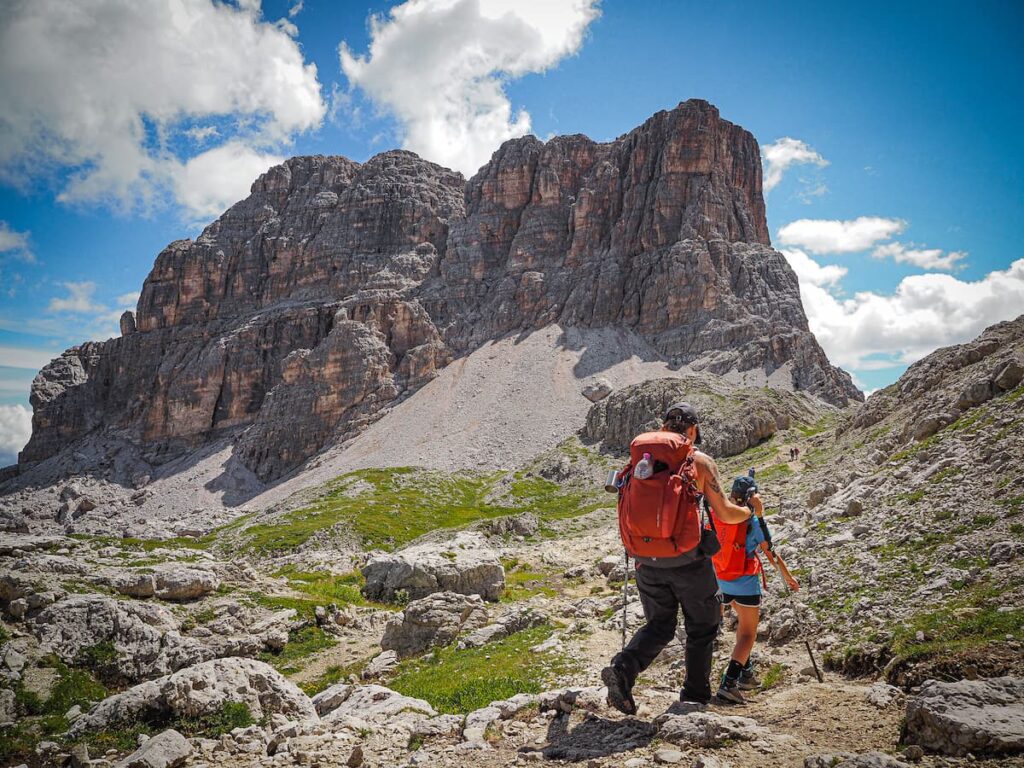
Hut to Hut Hiking in the Dolomites Free Course
Curious about hut-to-hut hiking in the Dolomites, but not sure where to start or what to expect? Sign up for our newsletter that simplifies and educates so you can focus on the views and vino. Get curious, get ready, and let’s get started! Sign up here👇🏼
- Free Email Course to Learn : Everything You Need to Know About Hut to Hut Hiking
We hope this guide filled with interesting information about How Hard Is the Tour du Mont Blanc has given you the proper information to plan your next adventure.

Author profile: Morgan Fielder is a Doctor of Physical Therapy and passionate hiker who believes in exploring the world on foot with good food. Follow her journey as she shares science-based hiking tips and advocates for sustainable tourism.

